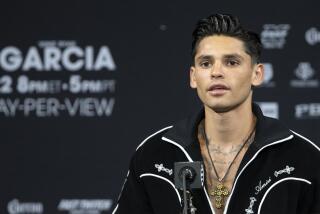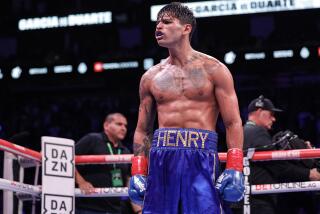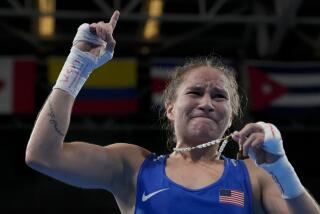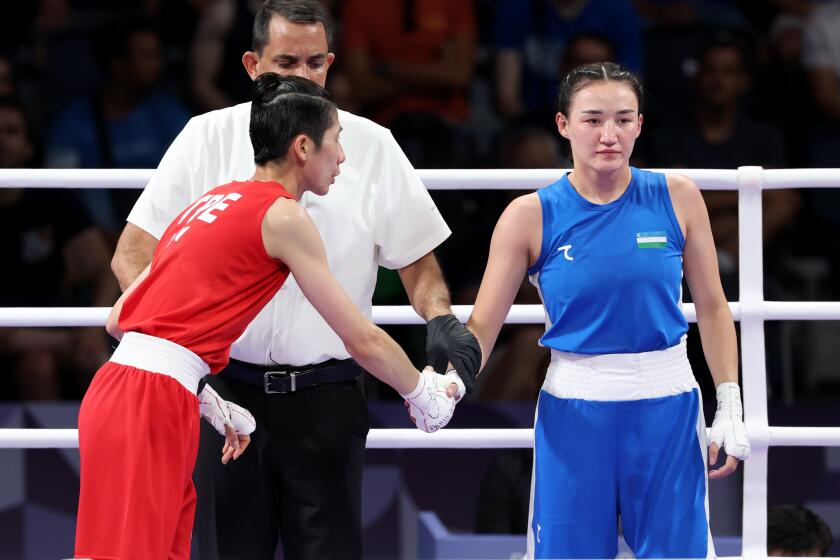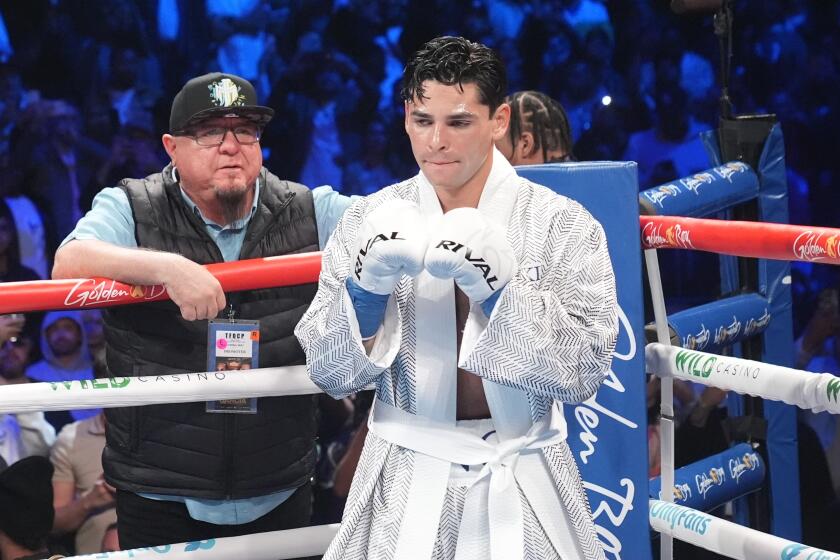Gervonta Davis saw things no child should see. Now he’s ‘blessed’ as a champion
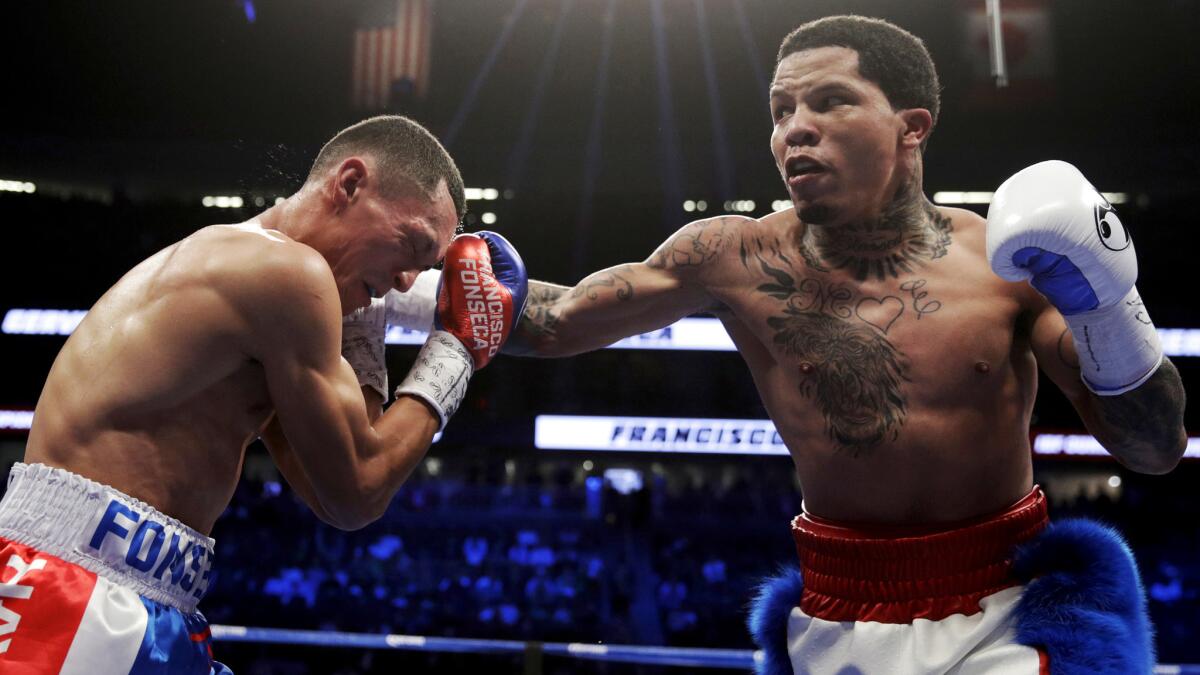
Gervonta Davis witnessed drug abuse as a youngster and survived an onslaught of gun violence around his Baltimore neighborhood that turned hearts dark.
Davis was 20 years into that life when he decided to get his neck tattooed, instructing the artist to inscribe a single word over his throat, seven letters that defined him: “Blessed.”
Hardened by his experiences, Davis will defend his World Boxing Assn. super-featherweight belt Saturday night at Dignity Health Sports Park in Carson against former super-bantamweight champion Hugo Ruiz in a Showtime-televised main event.
For Davis (20-0, 19 knockouts), the bout represents his best opportunity yet to establish himself as a viable pay-per-view fighter.
Davis was the youngest of three brothers at age 5, he said, when child protective services ordered their mother to give up custody of her children.
Davis’ mother told the Baltimore Sun in 2013 that she hoped to be able to provide a better life for her children than she received growing up. “He always told me not to feel bad, but being a mother I did feel bad about the things he’s experienced in his life,” she said.
With his father imprisoned, Davis said “my mother did drugs ... It took my grandma about three years to get us back as we went into different homes — to a foster family, to a group home. It was like we were locked up, too — the only times we could see our family was for about 30 minutes in this little room.”
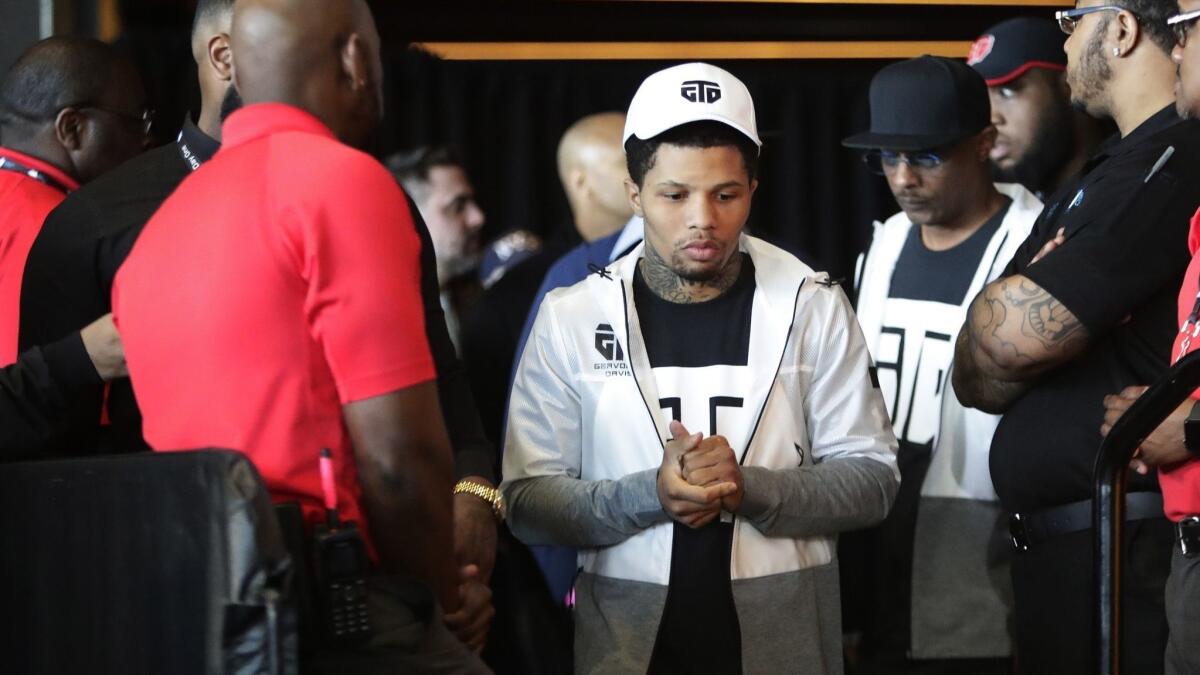
The disruption of those formative years hardened Davis, and at age 8, he’d fight with neighborhood kids. “I’d even fight my [15-year-old] brother’s battles,” he said.
His uncle, James Walker, observed one of the skirmishes and told his nephew, “We’ve got to turn something negative into a positive.” With financial assistance from another uncle to buy boxing equipment, they took him to a gym operated by coach Calvin Ford.
For those who watched the HBO series “The Wire,” Ford served as inspiration for the show’s character “Cutty.”
“Cutty is a former stick-up man who’s gone to jail for a long period of time,” as Ford did for 10 years on racketeering and conspiracy charges, said writer Jonathan Abrams, who authored a book on the show.
“He tries to turn his life around by working with kids in a boxing gym, trying to keep the next generation of kids off the streets,” Abrams added.
When he won his debut fight, Davis turned to find Ford and delivered him an extended hug.
“Even though I was in that gym fighting, I felt like I was getting the love I didn’t get at home,” Davis said. “After school let out around 2:30, I’d go straight to the gym to be the first person there, even though it didn’t open until about 4:30. I was the littlest one and I was good, so they took me serious.”
Despair surrounded Davis outside that gym. He recounts harrowing tales of sneaking over to his mother’s home to be near her. “Sometimes, she’d just leave me there by myself,” he said.
“If it wasn’t for the gym, I would’ve been out in the neighborhood running wild,” said Davis, who amassed a 206-15 record as an amateur. “But most of the time, I was out of town at tournaments, because I was winning so much.”
Baltimore’s unrelenting gun violence claimed Ford’s son, who first trained Davis, along with several members of the gym.
The Baltimore Sun reported that of the 343 people killed there in 2017, 301 were murdered by a firearm and 155 were shot execution style in the head. Ninety percent of the victims were black, 86% had criminal records and 13 of the dead were children.
“Baltimore’s this small city, and there’s times it seems like it’s the size of this room — everyone’s caught up in it, crossing paths,” Davis said Monday, sitting on one of two queen-size beds in his simple hotel room with the WBA belt atop the other.
While inner compasses malfunctioned for many in the streets, Davis said his guided him.
“I’ve always been the type to know that if I’m getting off the track, I know, ‘OK, it’s time to tighten up.’ I feel like I can see it before it comes … I used [life’s despair] to build me up … sometimes I’d sit there and think, ‘Why’s my father not here for me? Some of this stuff would be easier for me … ’
“It’s hard to continue to be great and have so much on your back, knowing that even a little mistake can mess you up for good. But it was motivation to stay strong, to keep my head above water and not get mixed up in that stuff.”
Ford, who remains Davis’ lead trainer, said he’s long been taken by the determination of the fighter nicknamed “Tank.”
Sign up for our daily sports newsletter »
“He could see he was bringing hope to the city and the kids in the gym,” Ford said. “The difference with Tank was he stayed in the gym. He’s competitive. He always wanted to be No. 1.”
After deciding to turn pro at 18 instead of waiting three more years for the 2016 Olympics, Davis aligned with manager Al Haymon of Premier Boxing Champions, then was ultimately signed by Floyd Mayweather Jr.’s promotion company after impressing the unbeaten champion at a sparring session.
“Floyd called me back the next week and I stayed with him ever since,” said Davis, now 24. “After I signed with him, anyone else who would sign with him — no matter what size — first had to go through me in sparring. I sparred every day for Floyd. That’s why he fell in love with me. He looked at me like a son.”
Mayweather gave Davis the exposure of fighting on his pay-per-view card, when Davis was the International Boxing Federation super-featherweight champion, but he lost his belt by missing weight. He responded by winning the WBA belt with a third-round technical knockout of former featherweight champion Jesus Cuellar last April.
When Davis was among a group of PBC fighters, including Jermell Charlo, Adrien Broner and Errol Spence Jr., who behaved erratically at a September card in Brooklyn, N.Y., Haymon summoned Davis for a private meeting.
“We just sat down talking and went over a lot of stuff that I can accomplish if I just stay focused and Al said, ‘Stay out of trouble, man,’ ” Davis said. “I always wanted to build that relationship with him. I knew what a great man he is. So I just listened to him.”
The words were penetrating and powerful. Haymon peered into Davis’ eyes and said, “I know you’ve been doing this by yourself this whole way, and I feel like you don’t trust anyone.
“Trust me,” Haymon continued. “What would an old man like me have to gain by misleading you? Trust me, and you can go a long way.”
With that significant backing, Davis is ready to be anointed as the best fighter from his hometown since Sugar Ray Leonard. He’s being pointed to a July homecoming fight, and possible marquee dates against featherweight champions Leo Santa Cruz and Gary Russell Jr., lightweight champion Vasiliy Lomachenko or prospects Ryan Garcia and Teofimo Lopez.
Six months ago, Davis’ girlfriend gave birth to his first child, daughter Gervanni, and his mother has been clean for 10 years.
“Normally when I train, I’m all mad, thinking about all I’ve been through to push me. I’m not in that space anymore,” Davis said. “I’m just happy to be back, and I feel like a little kid soaking in all the good vibes around me. I’m just ready to put on a good show.”
Take a good look at him, he advises, especially the hopeful word etched on his neck.
Twitter: @latimespugmire
More to Read
Go beyond the scoreboard
Get the latest on L.A.'s teams in the daily Sports Report newsletter.
You may occasionally receive promotional content from the Los Angeles Times.
